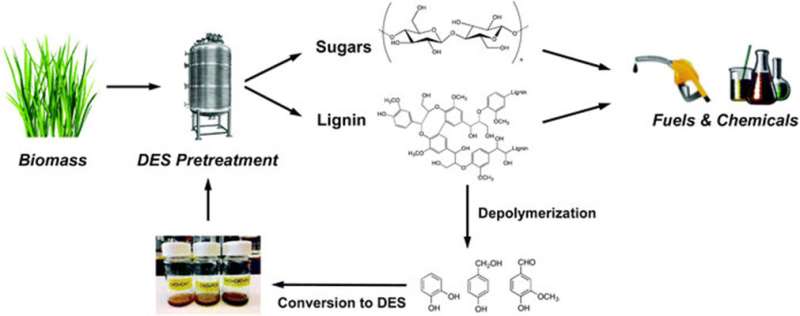Renewable solvents derived from lignin lowers waste in biofuel production

A closed-loop biorefinery could dramatically lower the cost of biofuels and related products. In this approach, the refinery produces the solvents it needs, rather than "importing" them. Scientists at the Joint BioEnergy Institute are developing a closed-loop biorefinery concept that uses waste lignin as a potential process solvent. How? They synthesized a new and renewable class of deep eutectic solvents. These solvents work well. When mixed with other liquids and used for biomass pretreatment, these solvents released sugar from grassy feedstocks for fuel and chemical production.
The deep eutectic solvents offer a wide range of advantages over other available biomass pretreatment options, such as ionic liquids. The solvents are easy to synthesize due to the wide availability of inexpensive waste lignin. Further, there's a good potential for significant scale-up of the solvent production process. Lignin is a major component of plant biomass. It is also a major waste stream during biomass processing. Turning waste into an asset makes these renewable solvents an attractive new approach for biomass conversion into biofuels and products that are less expensive. Further, the deep eutectic solvents offer a sustainable alternative to conventional solvents and ionic liquids.
Deep eutectic solvents (DESs) represent a new class of renewable solvents derived from the conversion of lignin-derived compounds. Naturally found in lignocellulosic biomass, lignin accounts for 20 to 30 percent of the dry weight of biomass. With the development of commercial production of biofuels and bioproducts, it is anticipated that a significant amount of lignin will be generated annually that needs to be converted into desired bioproducts. Thus, lignin valorization is a very important topic for researchers to address to enable the growth of a U.S. bioeconomy. Ten lignin-derived phenolic compounds were tested as hydrogen bond donors in varying mixtures with choline chloride to synthesize deep DESs—solvents that when mixed have a lower melting temperature than the individual solvents.
After initial screening, the team selected and used four DESs for biomass pretreatment of switchgrass. The researchers washed the pretreated biomass to remove potential inhibitory effects on enzymatic hydrolysis and fermentation. A fresh batch of the DES and choline chloride mixture resulted in approximately 87 percent glucose yield, while recycled DES resulted in decreased yields of 78 percent and 70 percent for second and third rounds, respectively. Biomass processes utilizing these renewable DESs could reduce operating costs by achieving a closed-loop biorefinery that generates the solvents needed for biomass pretreatment from the process of biomass conversion itself.
More information: Kwang Ho Kim et al. Biomass pretreatment using deep eutectic solvents from lignin derived phenols, Green Chemistry (2018). DOI: 10.1039/C7GC03029K
Journal information: Green Chemistry
Provided by US Department of Energy


















